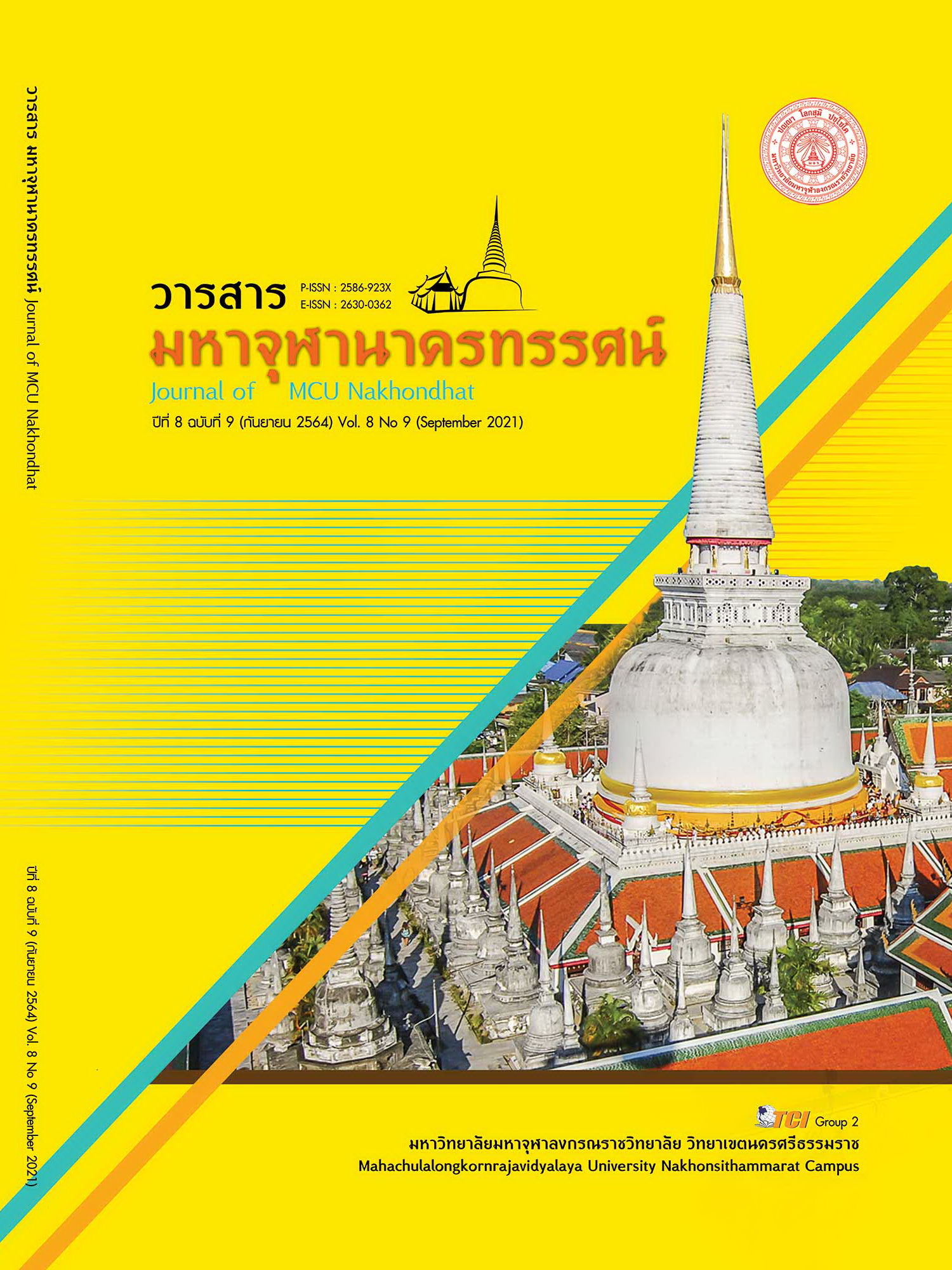THE MODEL OF STUDENTS’ GOOD CITIZENSHIP ENHANCEMENT INTEGRATING BUDDHISM
Main Article Content
Abstract
This research article aimed to 1. Investigate theories concerning the model of enhancing students’ good citizenship, 2. Construct good citizenship model for students by integrating Buddhism, and 3. Study the results of using the constructed model with students. Applying mixed methods research design, the participants were a school director, 4 teachers, and 150 students who are studying in junior high school. The research instruments were questionnaire, interview, and activities designed for enhancing students’ good citizenship though Buddhism. The results revealed as follows. 1) In terms of theories concerning model formulation and good citizenship, the concept of being good citizen originated from theories, experiences, and imagination. Based on accuracy, brevity, and understandability, it is presented in physical, realistic, and symbolic forms and it can be applied to enhance individuals’ good citizenship, responsibilities towards society, and respect for human rights. 2) The model for enhancing students’ good citizenship though Buddhism was developed from document analysis and field study, in which the data were collected by using questionnaire and interview. Implementing Buddhist Threefold Training: morality, concentration, and wisdom, the training activities were created. 3) After using the model, the overview of students’ role of being good citizen was at average level ( =3.48). Furthermore, students’ behavior changed positively at high level ( = 4.22) which indicated that by applying the formulated model, their behavior was improved positively and their responsibility was developed.
Article Details
References
คณะอนุกรรมการนโยบายปฏิรูปการศึกษา. (2554). ยุทธศาสตร์พัฒนการการศึกษาเพื่อสร้างความเป็นพลเมือง พ.ศ. 2553-2561. กรุงเทพมหานคร: สำนักนโยบายด้านพัฒนาคุณภาพและมาตรฐานการศึกษา สำนักงานเลขาธิการสภาการศึกษา กระทรวงศึกษาธิการ.
ดร.เลิศฤทธิ์ เรือนละหงส์. (18 พฤศจิกายน 2563). รูปแบบการสร้างเสริมการเป็นพลเมืองดีของนักเรียนเชิงพุทธบูรณการ. (พระศักดิธัช สํวโร (แสงธง), ผู้สัมภาษณ์)
ปริญญา เทวนฤมิตรกุล. (2555). การศึกษาเพื่อสร้างพลเมือง. กรุงเทพมหานคร: นามมีบุ๊คส์ พับลิเคชั่นส์.
พระราชบัญญัติการศึกษาแห่งชาติ พ.ศ. 2542. (2542.). เรียกใช้เมื่อ 10 กรกฎาคม 2564 จาก https://www.tungsong.com/Law/
พุทธทาสภิกขุ. (2549). การศึกษาสมบูรณ์แบบ : คือวงกลมที่คุ้มครองโลกถึงที่สุด. กรุงเทพมหานคร: อุษาการพิมพ์.
ลัดดา ตั้งสุภาชัย. (2553). ทศวรรษการเฝ้าระวังทางวัฒนธรรม. กรุงเทพมหานคร: ศูนย์เฝ้าระวังทางวัฒนธรรม.
วสันต์ หงส์สอง. (18 พฤศจิกายน 2563). รูปแบบการสร้างเสริมการเป็นพลเมืองดีของนักเรียนเชิงพุทธบูรณการ. (พระอนุสรณ์ กิตฺติวณฺโณ. (เรื่องปัญญารัตน์), ผู้สัมภาษณ์)
วิมลวรรณ ปินใจ. (แสงธง). (18 พฤศจิกายน 2563). รูปแบบการสร้างเสริมการเป็นพลเมืองดีของนักเรียนเชิงพุทธบูรณการ. (พระศักดิธัช สํวโร, ผู้สัมภาษณ์)
สมหวัง พิธิยานุวัฒน์. (2554). บทสรุปของผู้บริหารโครงการศึกษาวิจัยเรื่อง การปฏิรูปการเรียนการสอนระดับอุดมศึกษา. กรุงเทพมหานคร: คุรุสภาลาดพร้าว.
สำนักงานคณะกรรมการการศึกษาแห่งชาติ. (2542). พระราชบัญญัติการศึกษาแห่งชาติ พ.ศ. 2542 และแก้ไขเพิ่มเติม ฉบับที่ 2 พ.ศ. 2545. กรุงเทพมหานคร: โรงพิมพ์สำนักงานคณะกรรมการการศึกษาแห่งชาติ.
สำนักงานคณะกรรมการพัฒนาการเศรษฐกิจและสังคมแห่งชาติ. (2559). แผนพัฒนาเศรษฐกิจและสังคมแห่งชาติ ฉบับที่ 12 พ.ศ. 2560-2564. สำนักนายกรัฐมนตรี.
สำนักงานปลัดกระทรวงศึกษาธิการ. (2559). แผนพัฒนาการศึกษาของกระทรวงศึกษาธิการฉบับที่ 12 พ.ศ. 2560 - 2564. กระทรวงศึกษาธิการ.
Banks, J. A. Ed. (2004). Diversity and Citizenship Education: Global Perspective. San Francisco, CA: John Wiley & Sons, 2004.
Keeves, Peter J. (1988). Educational research methodology, and measurement: An international handbook. Oxford. England: Pergamon Press, 1988.


